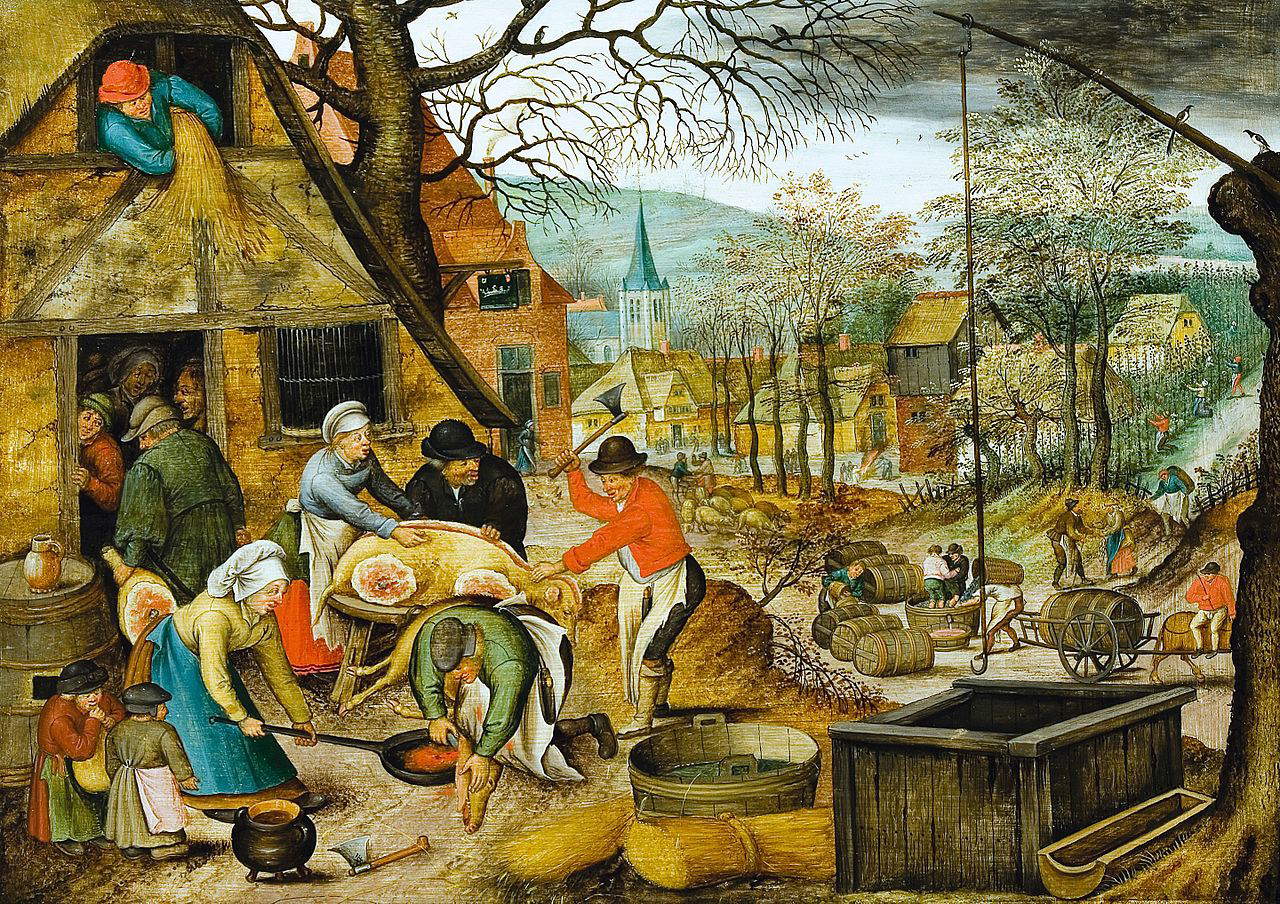Yesterday I was looking again at Autumn, the painting by Peter Bruegel the Younger. I was struck by the festive air that transpires from the canvas: the peasants in the foreground intent on working the pig, those in the background immersed in the practices of the grape harvest, with barrels, vats, grapes, and carts to transport the precious harvest. And still others ready to put pots on the fire (to be started), others glimpsed in the small house, busy observing, discussing, organizing the feast. Because autumn means celebration, community, social rituals: from festivals to dinners, from the (re)discovery of the products of the earth to the sweet melancholy associated with the passing of the season. Summer, the bearer of revelry and exaggeration, is behind us, winter with its climatic and physical rigors is yet to come. So it is the time to meet calmly, dialogue, confront each other, put into form and practice sacred (celebrations of the dead) and pagan (Halloween) rituals.
None of this seems to be thisutumn of our discontent. Falling back into a semi-confinement in which the often invasive rules of society impose a new social distancing, the renunciation of almost all rituals of community, the impossibility of getting together with friends for dialogic dinners or parlor conversations. Curfew, even, somewhat like what happened in Paris at the end of the 1500s, when at seven o’clock in the evening the bells of Notre-Dame gave the signal that people were obliged to lock themselves in their houses, doors bolted. And the art also takes its toll on the virus. Museums and exhibitions, which had strenuously resisted during the weeks of September and October, were forced to close by the latest meaty Dpcm. Yet, still, I wonder: are these places of culture really such impressive vehicles of contagion? Are there really such high probabilities of assemblages in picture galleries and Kunsthalle? I highly doubt it, but I can imagine the danger posed by the flow of people, even tourists, who would have moved to visit the Uffizi or the Vatican Museums devoid of the crowds of foreigners.
 |
| Pieter Bruegel the Younger, Autumn (1624; oil on panel, 42.8 x 59 cm; Bucharest, National Art Museum of Romania) |
But how did it get to this point, at least in Italy? Because of governmental inability to foresee the second wave, some say. Because of an overly permissive attitude allowed by some regional presidents, say others. However, the return of the virus is a fact and we find ourselves carpeted in different colors according to the provinces where one lives, stays, works, and studies. What strikes me, however, is the lack of responsibility shown by many. Civil and human responsibility, to abide by the rules of distancing during the summer months to protect the frail and respect all those belonging to the medical and health field who have struggled strenuously during the past months.
Looking back over the months that have just passed, say from June to October, it seems clear to me the shift that is characterizing our society: from care sui to neglect sui, from being a community (in purely theoretical terms) to turning into a kind of monad, capitalistically focused on thinking about one’s own fate, in a delirium of solipsistic individualism that considers the other as a con-current and not as a fellow human being, toward whom one should show solidarity and altruism especially if he or she is in danger of being in difficulty. Self-control has loosened somewhat, there is a tendency to override or overrule the other, in a Western society in which the barbarism of public discourse and a daily surplus of negative emotions is now certified by countless sociological studies. Does it matter, then, not to save the community but only oneself? Are we facing a regression to a Hobbesian society in whichlhomo homini lupus will return as the diriment rule? Yet, especially during a pandemic like the current one, the concept of freedom should coincide, in Kantian terms, with those of duty and responsibility. Not least because no one saves himself and there can be no future without a sociality that outlines the possibilities.
Have we therefore entered a process of destoricization, in which we realize that we no longer make history but find it already beautifully made by events beyond our control? To answer these questions requires extensive research. What seems clear to me is a further fraying of the social bond, overwhelmed by the disintegration of the common feeling that underlies the community of individuals to which we all, willingly or unwillingly, belong as human and social beings.
Warning: the translation into English of the original Italian article was created using automatic tools. We undertake to review all articles, but we do not guarantee the total absence of inaccuracies in the translation due to the program. You can find the original by clicking on the ITA button. If you find any mistake,please contact us.